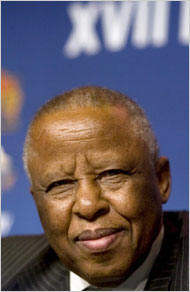|
Botswana’s
Ex-President Wins Leadership Prize

A foundation dedicated to
celebrating and encouraging good government in Africa awarded its
annual prize on Monday to Botswana’s former president, Festus G.
Mogae. He was honored for consolidating his nation’s democracy,
ensuring that its diamond wealth enriched its people and providing
bold leadership during the AIDS pandemic.
Mr. Mogae, 69, a man with a modest style, will receive $5 million
over the next 10 years and $200,000 per year thereafter for the rest
of his life. Over the coming decade, the foundation may also grant
another $200,000 a year to causes of Mr. Mogae’s choice.
The award, the Mo Ibrahim Prize for Achievement in African
Leadership, is bestowed by the Mo Ibrahim Foundation, named after
its founder, a Sudanese billionaire. Mr. Mogae was selected by a
six-member panel led by Kofi Annan, the former secretary general of
the United Nations. The panel also included this year’s winner of
the Nobel Peace Prize, Martti Ahtisaari.
Mr. Ibrahim said in a telephone interview that he hoped that the
prize would stir debate about the importance of leadership in Africa
and turn the spotlight on men and women who contribute the most but
receive far less attention than leaders like Zimbabwe’s president,
Robert Mugabe, who is still hanging on to power after 28 years in
office.
“Botswana has a wonderful story,” Mr. Ibrahim said. “Every man,
woman and child knows about Mugabe, but people say, ‘Mogae, who is
that?’ It’s great we honor people who honestly and cleanly served,
and served well, and left when their time was up.”
Mr. Mogae studied economics in Britain, first at the University of
Sussex and then at Oxford. He was twice elected president of
Botswana, one of Africa’s most reliable democracies, stepping down
in April. He took over what the prize committee described as a
country that was “already one of the continent’s success stories.”
“President Mogae’s outstanding leadership has ensured Botswana’s
continued stability and prosperity in the face of an H.I.V. and AIDS
pandemic which threatened the future of his country and his people,”
the committee said.
For years, Thabo Mbeki, the president of South Africa, the region’s
most powerful country, was in a kind of denial about AIDS and its
causes and resisted large-scale drug treatment of his people. During
that time, Botswana under Mr. Mogae’s leadership started an
ambitious effort to provide universal treatment.
He had himself tested publicly for H.I.V., the virus that causes
AIDS. When he realized that the stigma of H.I.V. and AIDS was so
great that people were avoiding testing, he changed the national
policy to make testing a routine part of medical care.
“That was a gutsy policy move,” said Richard G. Marlink, a professor
at the Harvard School of Public Health, who worked with Botswana to
help build its AIDS treatment program.
Since he stepped down in April after the two terms allowed under
Botswana’s Constitution, Mr. Mogae has continued his work to prevent
the spread of H.I.V. and AIDS through Champions for an H.I.V.-Free
Generation, a group of former African presidents and others sharing
the same goal.
Source:The New York Times
|
